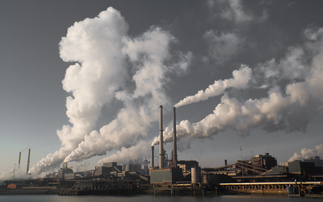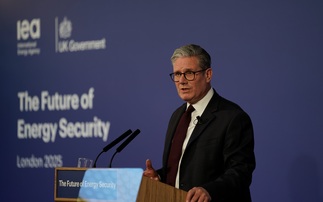As the US blogger David Roberts has highlighted the latest flurry of climate action reports all highlight how 'political will' is the crucial missing ingredient, but how can it be generated?
What next?
Another day, another report detailing how rapid decarbonisation is in everyone's economic interests. Another day, another alarming call for world leaders to urgently generate the political will required to deliver deep and sustained emissions cuts.
You would have been forgiven for feeling a touch of the 'deja vus all over again' today as a flurry of reports again detailed how climate action will deliver a massive economic boost. Following hot on the heels of the New Climate Economy initiative's landmark report last week on the $26tr of economic gains that would result from a global switch to low carbon infrastructure, yesterday it was the C40 group of cities and risk management giant DNV GL's turn to publish similar opuses reaching remarkable similar conclusions. Namely that plummeting clean tech costs and surging climate risks mean a fast-tracked low carbon industrial revolution is now the economically rational thing to do - and yet we are still not doing it nearly fast enough.
Consequently, it yesterday also fell to UN Secretary-General Antonio Guterres, London Mayor Sadiq Khan, and New York Mayor Bill de Blasio to issue the now customary call for political and business leaders around the world to prioritise climate action and move off what Guterres provocatively referred to as "the path of suicidal emissions". Today it will be UK Prime Minister Theresa May's turn as she opens the UK's Zero Emission Vehicle Summit, and then California Governer Jerry Brown and media mogul Michael Bloomberg will get their go as they open the Global Climate Action Summit on Wednesday.
If all this sounds a little jaded it is not meant to. All these various calls and interventions are hugely important and very welcome. They remind a political and media village with the attention span of a goldfish of the huge importance of the slow-moving climate, investment, and technology trends that will determine how the 21st century plays out.
But they also present a question posed to brutal effect by the US journalist and climate hawk David Roberts this weekend: now we've established decarbonisation makes economic sense and simply requires political will, what next?
1. I wanna do a little thread, drawing out one aspect of my recent post. I was gonna wait until there was a break in the torrent of insane news, but apparently that's never gonna happen, so I'll just send this out into the uncaring ether. https://t.co/nYxfoLp807
— David Roberts (@drvox) September 7, 2018
If you don't know Roberts you really should. His columns are the sine qua non for those seeking to understand the political and policy dynamics underpinning climate action. He is the climate hawks' climate hawk. Suffice to say, I am a fan.
His thread - which was sparked by the New Climate Economy report - poses some extremely tough questions for those businesses and campaigners trying to engineer a step change in decarbonisation efforts. It is worth reading in full, but the key takeaway is that the narrative that 'the economics of climate action stack up and all we need now is political will' leaves us with zero advice on how to generate said political backing.
As Roberts puts it: "We can't keep traveling up to the "leadership" question and then just ... waving our hands at it. "We have everything we need except political will" is NOT GOOD NEWS. It's like having everything you need to survive except water. Yer gonna die! ... To sum up: yes, we get it! We have to tools we need to transition to sustainability. It makes economic sense. We just need political will. Message received. Now, let's start thinking & talking seriously about HOW to generate political will."
To hammer home his point, it was made just hours before the latest round on UN climate talks once again ended in deadlock.
But what does a conversation about political will look like? How should a meaningful attempt to generate it proceed in the crucial two year run up to the Paris Agreement coming in to full effect in 2020?
No one is quite sure of the answer to these questions, but one thing is clear. Businesses and the public have to play a critical role. Because while it is increasingly obvious that climate action is a better bet than inaction from an economic perspective, that calculation still does not hold from a political perspective.
Politicians who care about tackling climate risks will often say they need businesses and campaign groups to lobby ever more effectively and make their case ever more vocally to provide the political elite with the space to introduce bolder decarbonisation policies. This always feels like a cop out: a failure to recognise that political leaders have an obligation to lead and a unique ability to make and shape public debate.
But they also have a point, because whenever political will in support of massive economic and social change has been generated in the past it has been on the back of a groundswell of public, and often corporate, support. Most politicians - even the ones who claim to revolutionary - tend to be inherently small c conservative, only pursing paths they are confident can command widespread support
The failure to date to generate sufficient political will behind climate action lays bare the harsh reality that the response to climate change is characterised by a brutal political power-play between incumbents and challengers, between inertia and momentum, between investment opportunities and sunk capital. It is a battle that is made all the more confusing by the fact it is taking place both between and within companies, communities, and political parties. Some days those demanding bold climate action win, but too often their victories are diluted by delaying tactics from those who wish to keep the high carbon economy alive for as long as possible.
This week's Summits in California and Birmingham, not to mention the various events scheduled for the run up to 2020, should increase pressure on politicians to act. They will again highlight how popular and cost effective clean technologies and sweeping decarbonisation plans now are. But until this messaging is accompanied by a more effectively targeted narrative that spells out how political leaders' relevance, popularity, and access to power will eventually be diminished by a failure to fully embrace climate action it will inevitably bump against the absence of deep-seated political will that has stymied global decarbonisation efforts to date.
What should this narrative look like? It is too early to tell, but a green business elite willing and able to assess precisely how much political capital opponents of climate action are expending, and then comfortably and consistently exceed it, would be as good a place as any to start.
This post first appeared as part of BusinessGreen's daily exclusive Overnight Briefing, which is available to all subscribers










